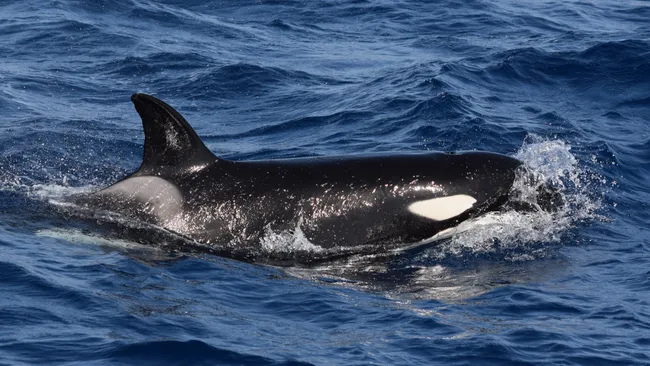Iberian orcas have damaged several boats off the coast of Spain in recent weeks, leaving authorities scrambling to rescue stranded crews.
Vigo, Spain – A small group of orcas (Orcinus orca) along the Spanish coast is once again causing havoc for sailors, tearing apart rudders and leaving crews stranded. These so-called Iberian orcas, a critically endangered subpopulation with fewer than 40 individuals, have been attacking boats off the Iberian Peninsula since 2020.
On August 21, a German sailboat in the Vigo estuary in Galicia suffered a brutal encounter when orcas ripped its rudder off, according to Spanish newspaper Faro de Vigo. The orcas continued to play with the disabled vessel, ramming it as it was towed to safety. The Pontevedra Civil Guard, a local law enforcement agency, shared footage of the rescue on the social media platform X, noting that multiple sailboats had been targeted.
Additional incidents followed, including August 30, when a traditional wooden sailing ship in O Grove, within the Arousa estuary, lost its rudder to the orcas. Another sailboat reportedly developed a leak after an encounter off Ons in the Pontevedra estuary.
Valentín Otero, the owner of the vessel attacked in O Grove, described the encounter:
“The truth is we were very frightened; in fact we completely freaked out when we realized the orcas were hitting the boat.”
Otero and his crew observed a large orca measuring about 23 feet (7 meters) accompanied by a smaller companion, a sight that left the sailors alarmed but unharmed.
Why Are Iberian Orcas Attacking Boats?
Scientists are still studying the unusual behavior, but early evidence suggests it is playful rather than aggressive. The attacks often target rudders on the underside of sailing boats, and experts believe young orcas are likely experimenting with new forms of entertainment. The recovery of Atlantic bluefin tuna populations in the region may also play a role, reducing the orcas’ hunting workload and leaving more time for recreational “mischief.”
Orca behavior is notoriously complex. Populations worldwide have been observed performing intricate social rituals, from gentle tongue-nibbling to acrobatic tumbling. Orcas can also develop unique dialects and local behavioral fads, such as swimming with objects on their heads, indicating cultural learning within pods.
Despite the dramatic encounters, there is no evidence that Iberian orcas are targeting humans. While orcas are top predators that hunt fish, seals, sharks, and occasionally whales, humans are not part of their diet. Documented attacks on humans in the wild are exceedingly rare and typically involve mistakes, such as mistaking a swimmer for prey.
Conservation Concerns
The Iberian orcas are critically endangered, and their interactions with boats highlight both the species’ intelligence and the delicate balance of human-wildlife coexistence. Researchers stress the importance of protecting these orcas, particularly as their playful attacks may lead to conflicts with local fishing and sailing communities.
“While these encounters can be alarming for sailors, they showcase the orcas’ curiosity and intelligence,” a marine biologist involved in studying the population said.
With continued monitoring and research, scientists hope to understand the motivations behind these boat attacks, ensuring both human safety and the protection of one of the world’s rarest orca populations.
